Holiday reading list
Books for the most curious and discerning on your list
Whether you're looking for good reads to add to your winter reading list, or for gifts for the most curious and discerning on your holiday list, consider these recent monographs authored by members of the UCLA Law faculty. Here, you'll find books that span the most important legal issues of our time.
Khaled M. Abou El Fadl
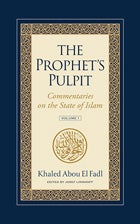
The Prophet's Pulpit: Commentaries on the State of Islam
Usuli Press (2022)
In this collection of twenty-two Islamic sermons, Khaled Abou El Fadl delivers incisive commentaries on the current state of Islam and the Muslim world from the symbolic pulpit of the Prophet of Islam. Part Qur'anic exegesis and part socio-ethical commentary, this volume showcases the knowledge, enlightenment, and dedication to justice that once propelled the Islamic civilization to great heights of human achievement.
Abou El Fadl is the Omar and Azmeralda Alfi Professor of Law.
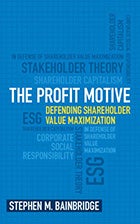 Stephen Bainbridge
Stephen Bainbridge
The Profit Motive: Defending Shareholder Value Maximization
Cambridge University Press (2023)
What responsibility, if any, does a corporation have to society? How should corporations balance environmental, social, and governance factors? The Profit Motive addresses these questions of corporate purpose using historical, legal, and economic perspectives. Bainbridge enters the debate around corporate social responsibility to mount an unabashed defense of shareholder capitalism and maximizing shareholder value. The book offers context for the current questions about corporate purpose, and provides a reference going forward.
Bainbridge is the William D. Warren Distinguished Professor of Law.
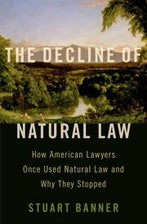 Stuart Banner
Stuart Banner
The Decline of Natural Law: How American Lawyers Once Used Natural Law and Why They Stopped
Oxford University Press (2021)
Before the late 19th century, natural law played an important role in the American legal system. Lawyers routinely used it in their arguments, and judges often relied upon it in their opinions. Today, by contrast, natural law plays virtually no role in the legal system. When natural law was part of a lawyer’s toolkit, lawyers thought of judges as finders of the law, but when natural law dropped out of the legal system, lawyers began thinking of judges as makers of the law instead. The Decline of Natural Law explores the causes and consequences of this change.
Banner is the Norman Abrams Distinguished Professor of Law.
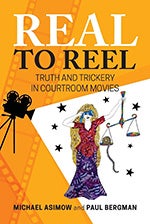 Paul Bergman (with Michael Asimow)
Paul Bergman (with Michael Asimow)
Real to Reel: Truth and Trickery in Courtroom Movies
Vandeplas Publishing (2021)
Real trials and courtroom movies are made for each other. Lawyers are storytellers, courtrooms are theaters, and the trial process provides drama, surprise, suspense or comedy.
Real to Reel serves as a video guide to help you identify the courtroom movies you’d like to see. It ranks each of the films on a one- to four- gavel system, with four gavels for the classics. And it answers the questions you’ll be asking as you see the films. Where does truth end and trickery begin? Can lawyers really pull rabbits out of hats with unexpected courtroom stunts? Did the trial process reveal the truth—or conceal it? How well do reel trials reflect real events?
Bergman is Professor of Law Emeritus.
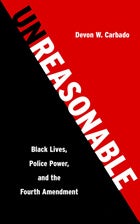 Devon Carbado
Devon Carbado
Unreasonable: Black Lives, Police Power, and the Fourth Amendment
The New Press (2022)
Published on the second anniversary of the global protests over the police killings of George Floyd and Breonna Taylor, Unreasonable is a groundbreaking investigation of the role that the law—and the U.S. Constitution—play in the epidemic of police violence against Black people. In this crucially timely book, Carbado explains how the Fourth Amendment became ground zero for regulating police conduct—more important than Miranda warnings, the right to counsel, equal protection and due process.
Carbado is the Honorable Harry Pregerson Professor of Law.
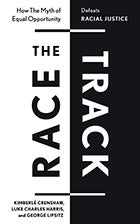 Kimberlé Crenshaw (with Luke Charles Harris and George Lipsitz)
Kimberlé Crenshaw (with Luke Charles Harris and George Lipsitz)
The Race Track: How the Myth of Equal Opportunity Defeats Racial Justice
The New Press (2022)
Despite the watershed election of Barack Obama--and the claims that racial history ended that day--the painful reality of racism in America has been thrust into the headlines over the past year. The Race Track dispenses with the myth of post-racial America, explaining not only why race matters more than ever but also how we can fashion twenty-first-century solutions to combating racial injustice. Arguing that there is no magic bullet, no one-size-fits-all solution to racial injustice, The Race Track champions an "intersectional" path--pioneered by Crenshaw--one that will appeal to people of all races who want to know how to speak the language of racial justice in an environment where many stubbornly claim we have already achieved it.
Crenshaw is Distinguished Professor of Law and Promise Institute Chair in Human Rights.
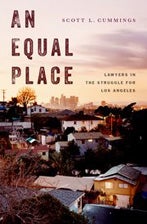 Scott L. Cummings
Scott L. Cummings
An Equal Place: Lawyers in the Struggle for Los Angeles
Oxford University Press (2021)
An Equal Place is a monumental study of the role of lawyers in the movement to challenge economic inequality in one of America's most unequal cities: Los Angeles. Breaking with the traditional focus on national civil rights history, the book turns to the stories of contemporary lawyers, on the front lines and behind the scenes, who use law to reshape the meaning of low-wage work in the local economy.
Covering a transformative period of L.A. history, from the 1992 riots to the 2008 recession, Cummings presents an unflinching account of five pivotal campaigns in which lawyers ally with local movements to challenge the abuses of garment sweatshops, the criminalization of day labor, the gentrification of downtown retail, the incursion of Wal-Mart groceries, and the misclassification of port truck drivers.
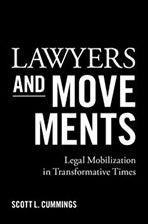
Lawyers and Movements: Legal Mobilization in Transformative Times
Oxford University Press (2023)
Fifty years after the Civil Rights Movement, America confronts a new democratic reckoning. What role do-and should-lawyers play in strengthening collective action at this pivotal moment? In Lawyers and Movements, Cummings offers an innovative answer to this age-old question, breaking from the legacy of legal liberalism to reveal the essential, yet underappreciated, work of lawyers in social struggle-redefining legal mobilization in transformative times. Building from a sweeping analysis of progressive legal theory and practice, Cummings challenges foundational critiques of lawyers as inaccurate and ill-suited to the current context. In response, he advances a new theory of legal mobilization in which control over law is at the heart of movements rising to meet the twin challenges of contemporary liberalism: promoting inclusion and equity, while fortifying democratic institutions.
Cummings is the Robert Henigson Professor of Legal Ethics.
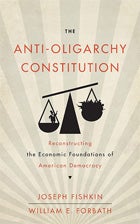 Joseph Fishkin (with William Forbath)
Joseph Fishkin (with William Forbath)
The Anti-Oligarchy Constitution
Harvard Univ. Press (2022)
Oligarchy is a threat to the American republic. When too much economic and political power is concentrated in too few hands, we risk losing the “republican form of government” the Constitution requires. Today, courts enforce the Constitution as if it had almost nothing to say about this threat. But as the authors show in this revolutionary retelling of constitutional history, a commitment to prevent oligarchy once stood at the center of a robust tradition in American political and constitutional thought.
Fishkin is Professor of Law.
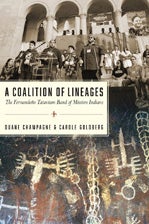 Carole E. Goldberg (with Duane Champagne)
Carole E. Goldberg (with Duane Champagne)
A Coalition of Lineages: The Fernandeño Tataviam Band of Mission Indians Paperback
University of Arizona Press (2021)
The Fernandeño Tataviam Band of California Mission Indians have lived in Southern California in the area now known as Los Angeles and Ventura Counties from time immemorial. Throughout history, these Indigenous Californians faced major challenges as colonizers moved in to harvest the resources of the California lands. Through meticulous archival research, the authors trace the history of the Fernandeño Tataviam Band from the time before the Spanish arrived in the Americas to the present day.
The authors explain how politically and culturally independent lineages merged and strengthened via marriage, creating complex and enduring coalitions among Indigenous communities. The Indigenous people of Southern California faced waves of colonizers—the Spanish, then the Mexicans, followed by Americans—and their coalitions allowed them to endure to today.
Goldberg is a Distinguished Research Professor and the Jonathan D. Varat Distinguished Professor of Law Emerita.
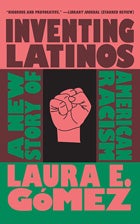 Laura Gómez
Laura Gómez
Inventing Latinos: A New Story of American Racism
The New Press, 2020 & 2022
Who are Latinos and where do they fit in America’s racial order? In this book, Gómez argues that it is only recently that Mexican Americans, Puerto Ricans, Cubans, Dominicans, Central Americans, and others are seeing themselves (and being seen by others) under the banner of a cohesive racial identity. And the catalyst for this emergent identity, she argues, has been the ferocity of anti-Latino racism.
Gómez is the Rachel F. Moran Endowed Chair in Law.
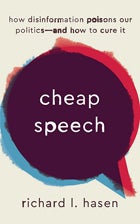 Richard Hasen
Richard Hasen
Cheap Speech: How Disinformation Poisons Our Politics—and How to Cure It
Yale University Press (2022)
What can be done consistent with the First Amendment to ensure that American voters can make informed election decisions and hold free elections amid a flood of virally spread disinformation and the collapse of local news reporting? With piercing insight into the current debates over free speech, censorship, and Big Tech’s responsibilities, Hasen proposes legal and social measures to restore Americans’ access to reliable information on which democracy depends.
Hasen is Professor of Law and Director of the Safeguarding Democracy Project.
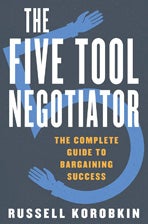 Russell Korobkin
Russell Korobkin
The Five Tool Negotiator: The Complete Guide to Bargaining Success
Liveright (2021)
The Five Tool Negotiator stands apart in a category saturated with breezy, self-help volumes as a compulsively readable and highly researched must-have for anyone looking to improve their bargaining skills. Nationally renowned scholar Russell Korobkin distills insights drawn from his decades of studying and teaching the keys to successful negotiations into five simple-yet-sophisticated strategies: Bargaining Zone Analysis * Persuasion * Deal Design * Power * and Fairness Norms.
Incorporating lively anecdotes and fascinating social science experiments, Korobkin brings to life concepts from the disparate fields of psychology, economics, and game theory. Designed for use at both the flea market and in the C-suite, this game-changing, universal approach provides a formula that a savvy reader can implement immediately.
Korobkin is Interim Dean and Richard C. Maxwell Distinguished Professor of Law.
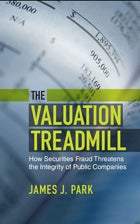 James Park
James Park
The Valuation Treadmill: How Securities Fraud Threatens the Integrity of Public Companies
Cambridge University Press (2022)
Public companies now face constant pressure to meet investor expectations. A company must continually deliver strong short-term performance every quarter to maintain its stock price. This valuation treadmill creates incentives for corporations to deceive investors. Published more than twenty years after the passage of Sarbanes-Oxley, which requires all public companies to invest in measures to ensure the accuracy of their disclosures, The Valuation Treadmill shows how securities fraud became a major regulatory concern.
Park is Professor of Law.
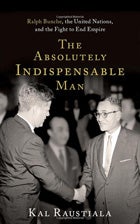 Kal Raustiala
Kal Raustiala
The Absolutely Indispensable Man: Ralph Bunche, the United Nations, and the Fight to End Empire
Oxford University Press (2022)
A legendary diplomat, scholar, and civil rights leader, Ralph Bunche was one of the most prominent Black Americans of the twentieth century. Yet today Ralph Bunche is largely forgotten. In this wide-ranging political biography of diplomat, Nobel prize winner, and civil rights leader Ralph Bunche, Raustiala restores Bunche to his rightful place in history.
Raustiala is the Promise Institute Distinguished Professor of Comparative and International Law and Director of the UCLA Ronald W. Burkle Center for International Relations.
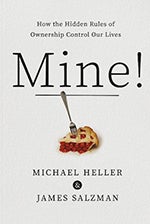 James Salzman (with Michael Heller)
James Salzman (with Michael Heller)
Mine!: How the Hidden Rules of Ownership Change Our Lives
Doubleday (2021)
“Mine” is one of the first words babies learn, and by the time we grow up, the idea of ownership seems natural, whether we are buying a cup of coffee or a house. But who controls the space behind your airplane seat: you, reclining, or the squished laptop user behind you? Why is plagiarism wrong, but it’s okay to knock off a recipe or a dress design? And after a snowstorm, why does a chair in the street hold your parking space in Chicago, while in New York you lose both the space and the chair?
In Mine!, the authors, two of the world’s leading authorities on ownership, explain these puzzles and many more.
Salzman is the Donald Bren Distinguished Professor of Environmental Law.
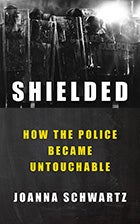 Joanna Schwartz
Joanna Schwartz
Shielded: How the Police Became Untouchable
Viking (2023)
In recent years, the high-profile murders of George Floyd, Breonna Taylor, and so many others have brought much-needed attention to the pervasiveness of police misconduct. Yet it remains nearly impossible to hold police accountable for abuses of power—the decisions of the Supreme Court, state and local governments, and policymakers have, over decades, made the police all but untouchable.
In Shielded, Schwartz exposes the myriad ways in which our legal system protects police at all costs, cutting across race, gender, criminal history, tax bracket, and zip code. The product of more than two decades of advocacy and research, Shielded is a timely and necessary investigation into why civil rights litigation so rarely leads to justice or prevents future police misconduct.
Schwartz is Professor of Law.
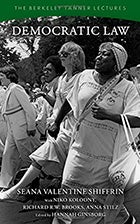 Seana Shiffrin
Seana Shiffrin
Democratic Law
Oxford University Press (2021)
In this book, based on her 2017 Berkeley Tanner Lectures, Shiffrin offers an original, deontological account of democracy, law, and their interrelation. Her central thesis is that democracy and democratic law have intrinsically valuable, interconnected communicative functions. Democracy and democratic law together allow us to fulfill our fundamental duties to convey to each another messages of equal respect by fashioning the sorts of public joint commitments to act that a sincere message of equal respect requires. Law and democracy are essential to each other: the aspirations of democracy cannot be realized except through a legal system, and, conversely, law can fulfill its primary function only in a democratic context.
After defending these theses, Shiffrin explores two doctrinal examples to illustrate how a communicative conception of democratic law would yield concrete implications.
Shiffrin is the Pete Kameron Professor of Law and Social Justice and Professor of Philosophy.
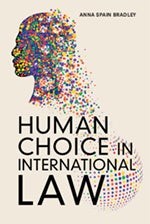 Anna Spain Bradley
Anna Spain Bradley
Human Choice in International Law
Cambridge University Press (2021)
Human Choice in International Law is an exploration of human choice in international legal and political decision making, investigating the neurobiology of how people choose and the history of how personal choice has affected decisions about international peace and security. It charts important decision moments in international law about genocide, intervention into armed conflict and nuclear weapons at the central institutions of the international legal order. Spain Bradley analyzes the role that particular individuals, serving as international judges or Security Council representatives, play in shaping decision outcomes and then applies insights from neuroscience to assert the importance of analyzing how cognitive processes such as empathy, emotion and bias can influence such decisionmakers. Drawing upon historical accounts and personal interviews, this book reveals the beauty and struggle of human influences that shape the creation and practice of international law.
Spain Bradley is Professor of Law and Vice Chancellor for Equity, Diversity and Inclusion.